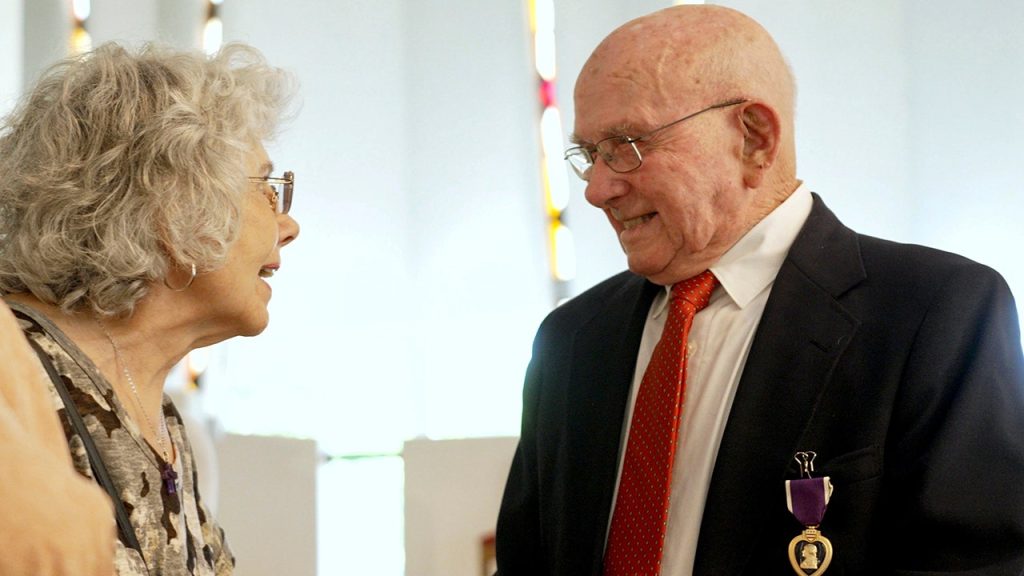Earl Meyer, a Korean War veteran from Minnesota, was finally awarded the Purple Heart medal after a long battle with the U.S. Army. Despite still having shrapnel in his thigh from combat injuries, he received the honor at a ceremony at Gustavus Adolphus College. The Army had previously rejected Meyer’s application for the medal due to a lack of paperwork. However, after the intervention of his daughters, attorney, U.S. Sen. Amy Klobuchar, and the sergeant major of the Army, a federal judge ordered a review of his case. The challenges faced by wounded veterans in obtaining the medals they’ve earned highlight the difficulties caused by the fog of war and the absence of records over time.
At the ceremony, Klobuchar presented Meyer with a certificate after he was pinned with the Purple Heart. She praised his service and dedication, stating that his efforts had made Minnesota, the country, and the world better. Meyer’s daughter, Sandy Baker, described her father as a different breed of combat veteran who was initially reluctant to push for recognition. However, he came to believe that his efforts would help other soldiers receive the recognition they deserved. Command Sgt. Major Jason Ross, representing Sgt. Maj. of the Army Michael Weimer, commended Meyer for his bravery and perseverance in the face of grueling combat conditions during the Korean War.
Meyer’s experiences in combat were harrowing, with few men in his unit surviving a mortar attack and only a handful making it out unharmed. The medic who treated him on the battlefield was killed before filing the paperwork for his injuries, which further complicated his case for the Purple Heart. Despite the Army’s initial denials, additional documents obtained with the help of Klobuchar’s office and the Department of Veterans Affairs confirmed Meyer’s combat injuries. An Army review board determined that the evidence was sufficient to establish beyond reasonable doubt that Meyer had been wounded in action in June 1951. The importance of recognizing the sacrifices made by veterans like Meyer is crucial for the community to remember.
Meyer’s humility was evident throughout the process, as he tended to downplay his experiences and injuries. His Legion coffee buddy, Dave Johnson, emphasized the importance of acknowledging the sacrifices made by individuals like Meyer for the country. Johnson highlighted the significance of individuals like Meyer who can say they have contributed to the country and made sacrifices for its safety. The persistence of Meyer and his family, along with the support of political figures and military leaders, ultimately led to the long-overdue recognition of his bravery and service. The Purple Heart award serves as a symbol of honor and gratitude for Meyer’s sacrifices during the Korean War.
The ceremony was an emotional moment for Meyer and his family, who were proud to see him finally receive the recognition he deserved. It was a reminder of the sacrifices made by veterans in defense of their country and the importance of honoring their service. Meyer’s case also shed light on the challenges faced by veterans in obtaining recognition for their sacrifices, especially when records are lost or destroyed over time. Despite the difficulties, Meyer’s perseverance and the support of his family and community ultimately led to him being awarded the Purple Heart medal, decades after he was wounded in combat. The dedication and sacrifices of soldiers like Meyer serve as a reminder of the courage and resilience displayed by those who have served in the military.


